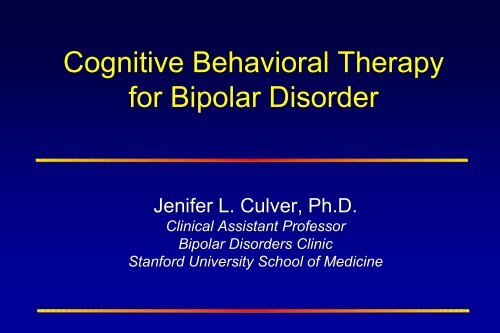Cognitive Behavioral Therapy for Bipolar Disorder
Cognitive Behavioral Therapy for Bipolar Disorder
Cognitive Behavioral Therapy for Bipolar Disorder
Create successful ePaper yourself
Turn your PDF publications into a flip-book with our unique Google optimized e-Paper software.
<strong>Cognitive</strong> <strong>Behavioral</strong> <strong>Therapy</strong><br />
<strong>for</strong> <strong>Bipolar</strong> <strong>Disorder</strong><br />
Jenifer L. Culver, Ph.D.<br />
Clinical Assistant Professor<br />
<strong>Bipolar</strong> <strong>Disorder</strong>s Clinic<br />
Stan<strong>for</strong>d University School of Medicine
Overview<br />
� Overview of CBT (cognitive behavioral therapy)<br />
� Does CBT work?<br />
� Getting started
Why is psychotherapy important?<br />
� Relapse is common even with optimal<br />
medication treatment<br />
� There is something else you can do!<br />
� Psychotherapy can improve illness course<br />
� Knowledge about therapy helps in choosing a<br />
therapist
What is <strong>Cognitive</strong> <strong>Behavioral</strong> <strong>Therapy</strong>?<br />
Feelings<br />
Thoughts<br />
SITUATION<br />
Behaviors
The Role of Thoughts<br />
� Thoughts / interpretations influence feelings<br />
Situation Interpretation<br />
A few people are<br />
yawning while I‛m<br />
speaking<br />
My talk is boring!<br />
I‛m a bad speaker!<br />
Some people are<br />
tired.<br />
Emotional Response<br />
Embarrassed,<br />
disappointed,<br />
angry at self<br />
Minimal response?<br />
Inspired/interested<br />
in engaging crowd
The Role of Thoughts<br />
� Thoughts / interpretations influence feelings<br />
Situation Interpretation<br />
Boss emails me<br />
to set up an<br />
appointment<br />
I‛m getting laid off!<br />
I‛m being assigned a<br />
new project.<br />
My boss wants a<br />
routine update on<br />
current projects<br />
Emotional Response<br />
Worried,<br />
devastated, angry<br />
Overwhelmed?<br />
Excited / hopeful?<br />
Calm? Stressed?<br />
Motivated
The Role of Thoughts<br />
� Thoughts / interpretations influence feelings<br />
� Distorted / biased thoughts lead to problematic<br />
emotions, moods, and behaviors<br />
� All or nothing thinking<br />
� Mind reading<br />
� Personalizing<br />
� Catastrophizing<br />
� Disqualifying the positive
“I’m getting laid off!”<br />
“Here comes the<br />
depression. I won’t be<br />
able to get a job if I’m<br />
depressed.”<br />
Feelings<br />
Worried, devastated, angry<br />
ANGRY<br />
Depressed Hopeless<br />
What is CBT?<br />
Thoughts<br />
Boss schedules<br />
meeting<br />
Behaviors<br />
Complain to others<br />
about company<br />
Sleep all weekend
Common CBT Strategies<br />
� Responses to unhealthy<br />
Thoughts<br />
� <strong>Cognitive</strong> Restructuring: Reevaluating<br />
negative thinking patterns<br />
� Strategies to promote effective problem<br />
solving<br />
� Mindfulness techniques to help clients gain<br />
some distance from negative thinking
Common CBT Strategies<br />
� Responses to unhealthy<br />
Behaviors<br />
� Clients taught to reenter situations they’ve<br />
been avoiding<br />
� Activities that provide pleasure / mastery are<br />
planned<br />
� Training in new skills (communication,<br />
assertiveness, social interactions)
Common CBT Strategies<br />
� Responses to painful<br />
� Clients learn how to accept or tolerate painful<br />
emotions and are sometimes taught how to<br />
change those emotions in the moment<br />
� Relaxation exercises<br />
Feelings<br />
� Strategies to manage extreme emotional<br />
reactions are taught
Goals of CBT <strong>for</strong> <strong>Bipolar</strong> <strong>Disorder</strong><br />
Psychoeducation<br />
Recognize Early<br />
Warning Signs<br />
Improve<br />
Functioning<br />
Medication<br />
Understanding<br />
& Adherence<br />
Prevent<br />
Relapse<br />
Mood<br />
Charting
What happens in therapy sessions?<br />
� Structured, with an agenda<br />
� Homework is key component<br />
� Assessment and tracking are common<br />
and guide treatment<br />
� Mood monitoring / symptoms<br />
� Thought records<br />
� Activity logs<br />
� Tracking of behaviors <strong>for</strong> change
% of Patients With Events<br />
Does CBT work <strong>for</strong> bipolar disorder?<br />
60<br />
50<br />
40<br />
30<br />
20<br />
10<br />
0<br />
Depression<br />
(P ( P
Limitations of CBT<br />
� Can be hard to find a good CBT therapist<br />
� CBT requires ef<strong>for</strong>t and work outside of<br />
sessions<br />
� CBT will not work <strong>for</strong> everyone
Getting Started: CBT Self Self Help Help
Conclusions<br />
� Medication alone is often not enough<br />
� Adding CBT can:<br />
� facilitate recovery from episodes<br />
� decrease or delay relapse<br />
� improve overall functioning<br />
� You are an active participant in treatment<br />
� You can get started today


